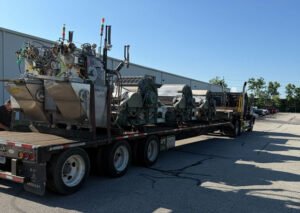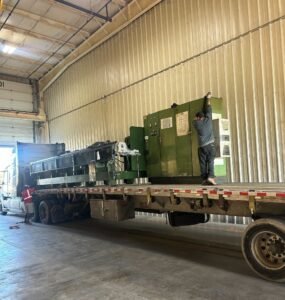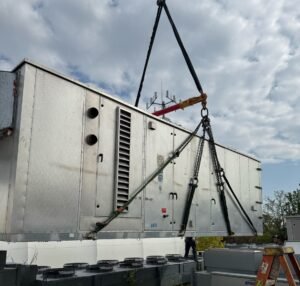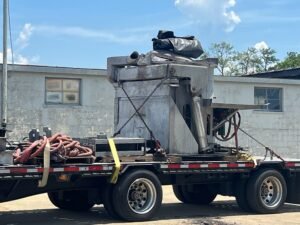Relocating heavy equipment requires meticulous planning, coordination, and precision. From securing the necessary permits to ensuring that the equipment is loaded, transported, and unloaded safely, each stage of the process has unique challenges. One of the most transformative advancements in heavy equipment relocation is GPS tracking technology. With real-time insights and data-driven management capabilities, GPS tracking enables efficient, cost-effective, and safe transportation of massive machinery across vast distances. In this article, we will explore the role of GPS tracking in heavy equipment relocation, its benefits, and its future in this industry.
Enhanced Visibility and Real-Time Monitoring
In the past, tracking the exact location and status of heavy equipment in transit required consistent communication, manual logging, and an intricate web of logistics to ensure everything was on schedule. However, with the introduction of GPS tracking, companies can monitor each piece of equipment in real-time, providing visibility and control throughout the relocation process.
- Location Tracking: GPS technology provides precise information on the equipment’s location, enabling relocation teams to track progress. This transparency ensures that both transport managers and clients are updated about estimated arrival times, routes taken, and any deviations. In addition, the equipment’s exact location can be pinpointed at any given time, reducing the risk of lost or delayed equipment.
- Route Optimization: Route planning is essential to reducing fuel costs, minimizing delays, and ensuring a smooth relocation. GPS tracking allows logistics teams to monitor real-time road conditions and make adjustments on the fly to avoid traffic, construction zones, and adverse weather conditions. By optimizing routes, companies can not only save on fuel costs but also reduce wear and tear on their vehicles and transported machinery.
- Remote Monitoring of Condition: Many GPS tracking systems are now equipped with additional sensors to monitor various conditions, such as temperature, humidity, and vibration levels. This is particularly valuable for sensitive machinery, as abrupt changes in these factors can lead to equipment damage. Real-time monitoring of these conditions ensures any issues can be flagged immediately, and appropriate action can be taken to prevent damage, thereby safeguarding the machinery’s longevity.
- Security Against Theft: Heavy equipment is often targeted for theft, especially when it is in transit. GPS tracking acts as a deterrent and an invaluable tool in recovery if equipment is stolen. When each piece of equipment is fitted with a GPS tracker, relocation teams and law enforcement agencies can work together to locate and recover stolen machinery quickly, minimizing financial and operational losses.
Improving Efficiency and Reducing Operational Costs
Moving heavy equipment is a costly endeavor. From fuel expenses to labor and vehicle wear, the relocation process often incurs significant operational costs. GPS tracking technology has shown tremendous potential to streamline the relocation process, leading to substantial cost savings for companies. Here’s how GPS tracking boosts efficiency and reduces operational costs:
- Fuel Efficiency: GPS tracking enables route optimization, which, as mentioned earlier, significantly reduces fuel consumption. By avoiding congested areas, heavy traffic, and unnecessary detours, GPS tracking allows trucks to use the most efficient routes. This not only saves on fuel but also reduces the time spent on the road, allowing teams to move on to other projects sooner.
- Fleet Management: Heavy equipment relocation often requires multiple trucks and trailers, especially for large-scale construction projects. GPS tracking allows managers to oversee multiple vehicles in a fleet, assigning equipment to the most appropriate vehicle based on its current location and route. Fleet managers can monitor vehicle maintenance schedules, fuel levels, and driver performance, ensuring efficient use of resources.
- Driver Performance and Accountability: GPS tracking systems can also monitor driver behaviors, such as speed, idling time, and harsh braking. This data allows companies to address any behaviors that could lead to increased fuel consumption or heightened risk of accidents. Monitoring driver performance promotes accountability and encourages drivers to adhere to best practices, leading to safer, more efficient relocations.
- Reduction in Downtime: Delays in heavy equipment relocation can disrupt project schedules and lead to costly downtime. GPS tracking provides teams with live updates, so they can adjust schedules or assign alternative resources if a delay is anticipated. By minimizing downtime, companies can avoid unnecessary expenses and maintain project timelines.
- Maintenance Management: GPS tracking systems can monitor engine hours, usage rates, and mileage, triggering alerts when maintenance is due. This is critical for reducing the risk of breakdowns during relocation, ensuring the fleet remains in optimal condition. By planning maintenance proactively, companies can avoid costly repairs and ensure that equipment remains reliable for each move.
Enhancing Safety and Compliance
Safety is paramount in heavy equipment relocation, both for the people involved and the machinery itself. GPS tracking helps create a safer work environment by promoting compliance, monitoring driving conditions, and minimizing risks associated with transportation. Here’s a closer look at how GPS tracking enhances safety and compliance:
- Safety Alerts: Many GPS tracking systems are equipped with alert functionalities to notify drivers and managers of unsafe driving conditions. Alerts for speeding, harsh braking, and route deviations allow for immediate corrective actions. Safety alerts promote responsible driving behavior, minimizing the risk of accidents and safeguarding the heavy equipment and operators involved.
- Ensuring Load Compliance: Transporting heavy equipment involves adhering to strict weight and load regulations, which vary based on region and road type. GPS tracking systems help ensure that companies stay compliant with these regulations by monitoring the load limits and providing alerts when adjustments are necessary. This reduces the risk of fines and prevents potential accidents caused by overloading.
- Emergency Response and Location: In the event of an emergency, such as a breakdown or accident, GPS tracking allows for a rapid response. The exact location of the equipment can be shared with emergency responders, enabling quicker assistance and reducing downtime. Additionally, many GPS systems can provide diagnostics of the equipment’s condition, which can aid in repair efforts and expedite the process of getting the equipment back on the road.
- Compliance with Industry Regulations: Various regulations govern the transportation of heavy equipment, including hours of service for drivers, load security, and equipment maintenance. GPS tracking assists companies in staying compliant with these regulations by providing automatic records and logs. In the event of an audit, companies can provide precise, documented proof of compliance, reducing potential fines and reputational damage.
- Environmental Compliance and Sustainability: With route optimization and improved fuel efficiency, GPS tracking reduces emissions and supports sustainability efforts. Environmental regulations are becoming increasingly stringent, and GPS tracking enables companies to document their compliance with emission standards. By tracking fuel usage and emissions, companies can identify areas for improvement, contributing to a more sustainable and eco-friendly relocation process.
Future Prospects: The Growing Role of GPS in Heavy Equipment Relocation
As the technology behind GPS tracking continues to evolve, the benefits for heavy equipment relocation are expected to grow. Advanced GPS systems will likely incorporate AI to enhance predictive maintenance capabilities, automate route planning, and provide even more precise data analytics. These developments will enable companies to further reduce costs, improve safety, and streamline their operations. GPS technology is also expected to integrate with Internet of Things (IoT) devices, creating a more interconnected and data-driven approach to heavy equipment management and relocation.
About Alltracon: Your Trusted Heavy Equipment Moving Service Provider
Alltracon specializes in efficient and reliable heavy equipment moving, utilizing advanced GPS tracking and logistics solutions to ensure seamless relocations for construction and industrial projects. Whether for short-distance moves or long-haul transportation, Alltracon’s dedicated team provides secure, timely, and cost-effective services, giving you peace of mind throughout every stage of equipment relocation.
Conclusion
In conclusion, GPS tracking has revolutionized heavy equipment relocation, providing unprecedented visibility, efficiency, and safety. As technology continues to advance, the potential for GPS tracking in the heavy equipment industry is immense, promising enhanced operational performance and streamlined logistics for companies worldwide. With a trusted service provider like Alltracon, companies can leverage these GPS-driven insights to ensure every relocation is a success.
















